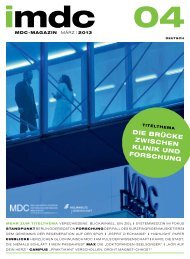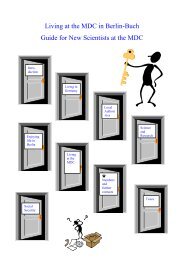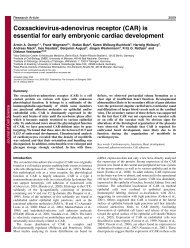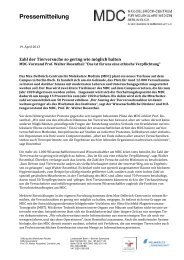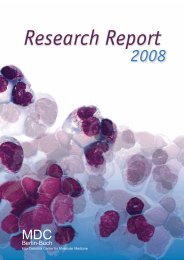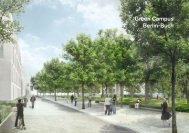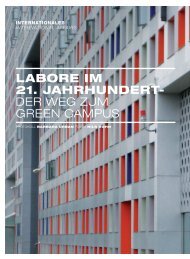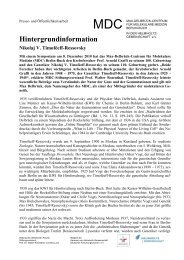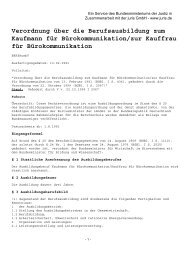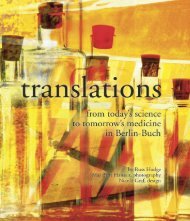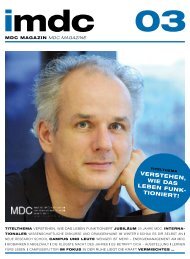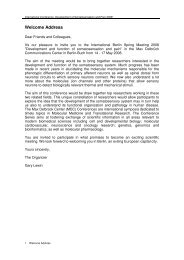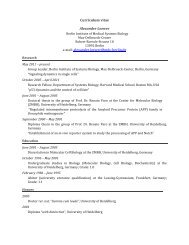iMDC03 zum Download (pdf)
iMDC03 zum Download (pdf)
iMDC03 zum Download (pdf)
Sie wollen auch ein ePaper? Erhöhen Sie die Reichweite Ihrer Titel.
YUMPU macht aus Druck-PDFs automatisch weboptimierte ePaper, die Google liebt.
Anniversairies<br />
and basic research. This was followed<br />
by the key appointments of Helmut<br />
Kettenmann, Walter Birchmeier, Udo<br />
Heinemann and many others. The new<br />
beginning engendered a tremendous<br />
sense of anticipation about the future,<br />
which was shared by everyone at the<br />
MDC. This soon resulted in scientific<br />
achievements, and as a consequence,<br />
ever more positions were funded by<br />
external grants.<br />
Opening ceremony of<br />
the MDC in 1992<br />
The actual opening ceremony was<br />
originally scheduled to take place in<br />
the spring. Due to the death of Willy<br />
Brandt, however, the ceremony was<br />
postponed until December 7, 1992, and<br />
was attended by the Federal President<br />
of Germany, Richard von Weizsäcker,<br />
Science Minister Heinz Riesenhuber,<br />
Senator Manfred Erhardt and President<br />
of the Leopoldina Professor Benno<br />
Parthier. Behind the cafeteria was a<br />
large open space. Barrack buildings<br />
were still on campus at that time,<br />
used for storing coal. Coal dust usually<br />
covered everything in sight, but extra<br />
for the ceremony, the area was cleaned.<br />
Then President Weisäcker arrived in his<br />
helicopter, and the whirling helicopter<br />
blades distributed the dust all over the<br />
place again. — President von Weizsäcker<br />
was interested in everything, and<br />
spent the entire morning exploring the<br />
campus and talking with many of the<br />
staff members.<br />
The three pillars of<br />
Campus Buch<br />
The development of the research<br />
center was accompanied by first spinoffs<br />
from the MDC. Dr. Gudrun Erzgräber<br />
began establishing the campus<br />
management. On June 8, 1995 the MDC<br />
subsequently founded a biotechnology<br />
park, which is now the BBB Management<br />
GmbH Campus Berlin-Buch.<br />
Thus, the campus had three “pillars”:<br />
Science in the MDC and the FMP, their<br />
application in the hospitals of the<br />
Charité and their commercialization<br />
in the economy, the companies of the<br />
BiotechPark Berlin-Buch. The cooperation<br />
between these three areas created<br />
Participants of the European Symposium at the MDC, September 1994<br />
jobs and promoted the development of<br />
a major research institution that had<br />
a new style. The open Campus Berlin-<br />
Buch became a magnet for scientists,<br />
clinicians, companies from near and<br />
far, but also for the citizens of Berlin<br />
and Buch. The art and sculpture park,<br />
public events, the Life Science Learning<br />
Lab, the sports facilities and Café Max<br />
strengthened the identification of the<br />
local Buch community with the campus.<br />
The development of Buch itself was<br />
spurred by the success of the campus,<br />
as can be seen with the new shopping<br />
center, the artists’ courtyard, the new<br />
Helios hospital and the development of<br />
other clinic sites, etc.<br />
The recipe for<br />
success<br />
Detlev Ganten likes people and<br />
enjoys his work, which is readily apparent<br />
when one meets him. “You have to<br />
have a vision,” he said, quoting Karl<br />
Popper, his favorite philosopher. Popper<br />
writes that “optimism is a moral duty”<br />
not because everything is somehow OK<br />
“in the best of all worlds” as Voltaire’s<br />
Candide says. For Ganten, the best<br />
recipe for success is to have a longterm<br />
perspective, a common objective<br />
and honest dialogue. The same maxim<br />
applies to science as well as to the<br />
establishment of scientific structures:<br />
no one knows the outcome beforehand.<br />
And even if at the beginning no one<br />
knows the “right way”, what is important<br />
is a constant willingness to engage<br />
in dialogue, to modify one’s ideas,<br />
and eventually even to give up old<br />
hypotheses – for Ganten these are the<br />
prerequisites for success. Perhaps the<br />
beginning was so successful because it<br />
was built on a solid philosophy based<br />
on dialogue and on the conviction<br />
Ganten communicated that all goals<br />
could be achieved by working together.<br />
And everyone did work hard! The meetings<br />
that continued into the early hours<br />
of morning are legendary. Ganten was<br />
accessible to all employees, who could<br />
call and arrange a time to speak with<br />
him. At the beginning the MDC had only<br />
350 positions. But a way was found to<br />
fund people temporarily through the<br />
University Development Program (HEP)<br />
and through external grants, so that<br />
they could continue their research. Now<br />
the MDC has a staff of more than 1000,<br />
and more than 2.000 people work on<br />
campus. In the early days, soon after<br />
reunification, the MDC proved to be<br />
truly democratic. The orientation was<br />
clear: for the MDC to be one of the best<br />
research centers, committed to the<br />
well-being of its staff members, who<br />
were to pursue their research in a safe<br />
environment on an open campus with<br />
which they could identify.<br />
imdc03 2012<br />
21



